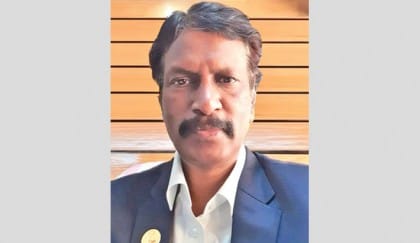Shamim Jahangir:
State-owned West Zone Power Distribution Company Ltd (WZPDCL) is targeting to manufacture prepaid smart electric meters locally to meet the demand for 35 million units of smart meters.
WZPDCL’s manufacturing plant Bangladesh Smart Electrical Co Ltd (BSECO) currently produces around 5,000 meters per day. After the launching of the manufacturing unit jointly with Chinese firm Hexing Electrical Co Ltd the cost of prepaid has come down by nearly 50 per cent.In an interview with the Daily Sun business editor, WZPDCL Managing Director Engr Md Shafique Uddin shared the latest activities of WZPDCL and its plan to expand and improve its services.
Engr Md Shafique Uddin said WZPDCL has created a competition in the market that helped reduce the cost of prepaid meters.
Q: How the West Zone Power Distribution Company Ltd (WZPDCL) has been operating during the Covid-19, and what are the responsibilities it has been performing?
A: WZPDCL is responsible for operating, maintaining and developing country’s south-western zone power sector, which includes 21 districts and 20 upazilas. We have taken up several projects to develop quality electric supply in this area. In 2015, WZPDCL has taken up four projects— SPDS project, the Expansion and Upgradation project, the Extension and Augmentation project and the Smart prepayment meter project. Through the SPDSC project, we are constructing distribution lines and sub-station; the Extension project focuses on power line construction and rehabilitation. The Upgradation project is dedicated to newly constructing and upgrading the 33/11kv Sub-station to increase its capacity. Till now, work for 31 new substations is underway, while 30 substations are going through an upgradation. We are also constructing 33kv distribution line. Lastly, installation of smart prepayment is one of the key projects because we finished setting up 30,000 meters , and maintaining transparency, we have been able to set up another 31,000 meters at the same project cost. The cost of the four projects is around Tk 40 billion, and all the projects are expected to be finished by 2023.
At present, under the smart prepayment meter project, WZPDCL plans to install 500,000 meters. Of the 500,000 meters, we have installed 300,000 meters so far, and the rest of the meters will be installed soon. WZPDCL is also looking forward to installing another 900,000 smart prepayment meters since we have at present roughly a total of 1,300,000 consumers. It is worth mentioning that WZPDCL is the first distribution company to install smart prepayment meters. However, it will be challenging to reach the goal of providing a smart prepayment meter to each customer after importing prepayment meters because there are around 35 million active power consumers in the country.
WZPDCL has jointly collaborated with a Chinese company to manufacture prepayment meters locally. At the same time, we issued an open tender to get quality meters at the cheapest rate possible so that we can speed up our project. So far, we have supplied prepayment meters to Dhaka Power Distribution Company (DPDC). We are also going to supply meters to Bangladesh Power Development Board (BPDB) and Dhaka Electric Supply Company (DESCO) shortly.
Q: How many meters are you producing annually, and what would be the cost if you had to import meters?
A: At present, the manufacturing plant can produce around 5,000 meters every day. This means we can produce at least 150,000 meters per month. If we increase the production line, we will also be able to increase our production.
The price of the meters manufactured locally is quite reasonable and as we are issuing tenders the price decreased significantly. Compared to the imported prepayment meters, our prepayment meter costs Tk 700-800 less. The price will decrease further in the future. Generally, imported meters cost more than locally produced meters. For instance, an imported single-phase meter costs around Tk 8,000, whereas WZPDCL offers the same product at Tk 4,500. Earlier, we provide single phase meters to DPDC at Tk 4,500 per unit. In addition, the ministry created a committee to determine the price for the single and three phase prepayment meters on Digital Panel Meter (DPM).
At present, we are successfully producing single-phase meters in the country and for which a research and development section needs to be established for adopting new advancement in meter technology with more efficient production process. Bangladesh is one of the countries which has paved the way for establishing a research and development section to produce prepayment meters with latest technology; otherwise, it would be difficult to follow. The company with which we have started this joint venture has the resources— latest technology and intense research and development capability to help us produce meters efficiently.
WZPDCL owns a 51 per cent share in the joint venture and approximately 60 skilled persons are employed in the factory. Other than this, around 300 people are employed in the meter installation projects under WZPDCL and DPDC which will be increased gradually with inclusion of more new projects under different utilities.
Q: Do you assemble those prepayment meters or manufacture them?
A: At present, we are assembling the meters, but we have a plan to manufacture those in our plant when the company reaches to its stable position in the market because it will need a handsome amount of investment to go into manufacturing.
Q: Of the total demand for prepayment meters, how much has this company supplied so far?
A: Although we have just started manufacturing recently, so far, we have supplied around 170,000 meters. Meanwhile, we are going to supply and installing 20,000 meters to DPDC while negotiation is underway with BPDB to supply around 60,000 prepayment meters.
Q: Have you informed the finance and power division to procure prepayment meters from a local company directly?
A: Since this prepayment meter manufacturing plant was approved by the cabinet and Prime Minister Sheikh Hasina very kindly gave the name of the company, we are looking forward to manufacturing other electrical equipment and devices apart from the prepayment meters. Our prepayment meters are more efficient and quality tested because we are ensuring 10 years long-lasting and 3 years of warranty on our meters. In contrast, the imported meters don’t have any such guarantee or warranty. Besides, our prepayment meter users can also avail after-sales service, which imported meters don’t offer. In my opinion, producing meters in the country is one of the most outstanding achievements in the power sector.
Moreover, we are contemplating to export prepayment meters to the neighbouring countries because many countries don’t have their own manufacturing plant. For instance, India doesn’t have a prepayment meter manufacturing plant, and they import all of their prepayment meters.
Q: How much investment the plant required?
A: Initially, we started our manufacturing plant with an investment of only Tk 150 million.
Q: How much the coronavirus pandemic has affected the manufacturing plant’s activity?
A: During the coronavirus pandemic, our manufacturing flow was significantly interrupted because we couldn’t use our entire workforce in such a situation. Our production resumed in full swing in July 2020. Furthermore, we also ensured all safety measures in the factory though the possibility of getting affected by the coronavirus was low because all of the workers in the plant were bound to wear a gown, hand gloves, and necessary safety equipment, which eventually protected them.
Q: How much loss did WZPDCL had to face due to Covid-19 crisis?
A: WZPDCL faced the lowest-possible loss during the COVID-19 crisis.
Q: Has the WZPDCL asked for any compensation from Bangladesh Energy Regulatory Commission (BERC)? DPDC and DESCO have already sought compensation to cope with losses.
A: Although we haven’t asked for any compensation from BERC, we asked for an upward tariff adjustment. If the bulk is adequately adjusted, then we will be able to recover from our loss.
Retail adjustment is not necessary.
Q: During the COVID-19 crisis, many subscribers lodged complaints against other power distribution companies. How WZPDCL’s services were received by the consumers during Covid-19?
A: I can confidently say that WZPDCL never faced this kind of situation because we never created any ghost bill or excessive bill for our customers; hence, if you investigate, you will find almost zero complaints. For instance, our CB ration (Collection Billed ration) was in the highest level as we received the same as the billed amount. This reflects that our customers don’t have any complaint against us. We, WZPDCL, always strive to provide the best service to ensure cent per cent customer satisfaction.
Q: How the coronavirus pandemic affected WZPDCL’s demand?
A: Similar to other power distribution companies, the demand from our subscribers’ end decreased to a great extent. Demand dropped by around 25 per cent, but now the situation has improved. Currently, we have noticed an increase in demand, which is around 400 MW though the demand is estimated during the winter session. During the summer, the demand increases to 600-650 MW.
Q: What is your current growth rate?
A: Till now, we couldn’t reach our expected growth rate; for instance, we have 5-6 per cent annual growth. We have speculated that the growth will increase owing to the Padma Bridge. We have projected that the growth will reach at least 10 per cent when all the development projects are implemented.
Q: How much is your system loss now?
A: At present, the WZPDCL is in excellent condition where our system loss is 8.83 per cent, which is comparatively better. Earlier before my joining, the system loss was 11 per cent.
Q: How much system loss are you planning to decrease by 2030? Do you have any calculation on how much loss WZPDCL is bound to bear due to system loss?
A: We are expecting to minimise the system loss to less than 7 per cent by 2030. Of course, we have calculations, and primarily, we have noticed around Tk 90-100 million.
Q: When WZPDCL will be able to ensure cent per cent uninterrupted power supply?
A: Although we are providing almost uninterrupted power at present, sometimes it gets interrupted due to unwanted situations. To ensure an uninterrupted power supply, WZPDCL has introduced a Hot line with customer care centre in each office which can be reached at 16117 because upon receiving any complaint, we immediately take steps to resolve this.
With the view to ensuring uninterrupted power supply, we have taken a project: ‘underground distribution system’ which will be financed by Asian Development Bank (ADB). However, due to the coronavirus pandemic, ADB couldn’t finance us in the present financial year. Moreover, ADB selected Tata consultants, and they have already submitted their feasibility reports for Khulna, Barisal, and Jashore.
Q: When will WZPDCL initiate the underground project?
A: Actually, the project initiation depends on the ADB’s finance. We will kick-off the project as soon as we receive the funds. However, if there is any delay in ADB finance, we will look for alternative options to start the underground cabling replacing the age old overhead lines in Jashore and finish by 2024. Besides, we also have a plan to bring Gopalganj city under the underground cabling facility. Regarding the project, it depends on several aspects, including substation, transmission, and others. To estimate the project cost for Khulna, Jashore and Barishal city it will cost around Tk 90- 100 billion as this kind of project is quite expensive.

